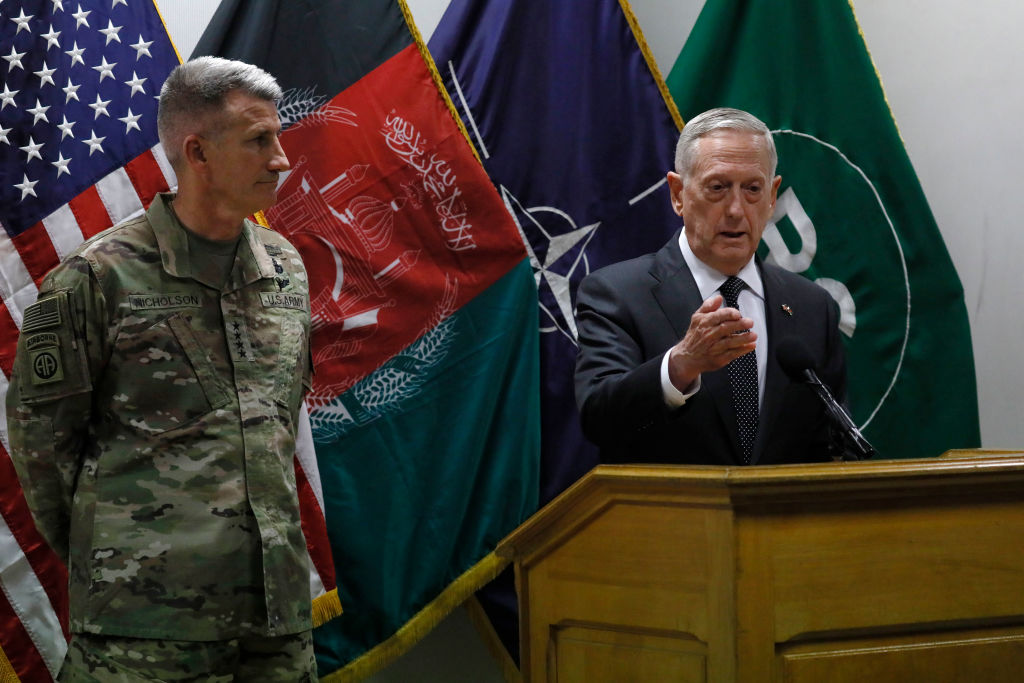Russia is arming the Afghan Taliban, Defense Secretary James Mattis suggests in Kabul


A free daily email with the biggest news stories of the day – and the best features from TheWeek.com
You are now subscribed
Your newsletter sign-up was successful
The U.S. and its NATO allies have been fighting the Taliban in Afghanistan since soon after the 9/11 terrorist attacks on New York and Washington in 2001, though the mission officially changed to training the Afghan army and police a few years ago. On Monday, Defense Secretary James Mattis made an unannounced visit to Afghanistan to assess the situation as President Trump decides whether to send more troops to help quash a resurgent Taliban. Mattis and the top U.S. commander in Afghanistan, Gen. John Nicholson, strongly suggested that Russia is behind a flood of arms to the Taliban.
The U.S. will have to "confront Russia" over "denying the sovereignty of other countries," including Afghanistan, Mattis said at a news conference in Kabul on Monday. "For example, any weapons being funneled here from a foreign country would be a violation of international law." When asked if he wanted to refute reports that Russia is arming the Taliban, Nicholson said, "Oh no, I'm not refuting that," adding that the U.S. has continued to receive such reports of Russian assistance to the Islamist insurgents.
After the Soviet Union invaded Afghanistan in 1979, the U.S. covertly supplied arms to the Afghan mujahideen resistance, which eventually caused enough loss of Russian blood and treasure that Soviet Russia pulled out in 1988. The loss in Afghanistan has been credited as a significant cause of the Soviet Union's fall in 1991.
The Week
Escape your echo chamber. Get the facts behind the news, plus analysis from multiple perspectives.

Sign up for The Week's Free Newsletters
From our morning news briefing to a weekly Good News Newsletter, get the best of The Week delivered directly to your inbox.
From our morning news briefing to a weekly Good News Newsletter, get the best of The Week delivered directly to your inbox.
A free daily email with the biggest news stories of the day – and the best features from TheWeek.com
Peter has worked as a news and culture writer and editor at The Week since the site's launch in 2008. He covers politics, world affairs, religion and cultural currents. His journalism career began as a copy editor at a financial newswire and has included editorial positions at The New York Times Magazine, Facts on File, and Oregon State University.
-
 How the FCC’s ‘equal time’ rule works
How the FCC’s ‘equal time’ rule worksIn the Spotlight The law is at the heart of the Colbert-CBS conflict
-
 What is the endgame in the DHS shutdown?
What is the endgame in the DHS shutdown?Today’s Big Question Democrats want to rein in ICE’s immigration crackdown
-
 ‘Poor time management isn’t just an inconvenience’
‘Poor time management isn’t just an inconvenience’Instant Opinion Opinion, comment and editorials of the day
-
 Operation Rubific: the government's secret Afghan relocation scheme
Operation Rubific: the government's secret Afghan relocation schemeThe Explainer Massive data leak a 'national embarrassment' that has ended up costing taxpayer billions
-
 British warship repels 'largest Houthi attack to date' in the Red Sea
British warship repels 'largest Houthi attack to date' in the Red SeaSpeed read Western allies warn of military response to Iranian-backed Yemeni rebels if attacks on ships continue
-
 Houthi rebels claim Red Sea ship attacks
Houthi rebels claim Red Sea ship attacksspeed read Iran-backed Yemeni group vows to escalate aggression towards Israel-linked vessels in revenge for Gaza war
-
 Israel plans next phase of Gaza war as first hostages released
Israel plans next phase of Gaza war as first hostages releasedSpeed read After four-day ceasefire 'we will not stop' until destruction of Hamas, says Israel
-
 Mob storms Russian airport 'looking for Jews'
Mob storms Russian airport 'looking for Jews'Speed Read Plane from Israel surrounded by rioters chanting antisemitic slogans after landing in Russia's Dagestan region
-
 Tuberville's military promotions block is upending lives, combat readiness, 3 military branch chiefs say
Tuberville's military promotions block is upending lives, combat readiness, 3 military branch chiefs saySpeed Read
-
 Ukraine's counteroffensive is making incremental gains. Does it matter in the broader war?
Ukraine's counteroffensive is making incremental gains. Does it matter in the broader war?Speed Read
-
 US commissions first-ever Navy ship in a foreign port
US commissions first-ever Navy ship in a foreign portSpeed Read
